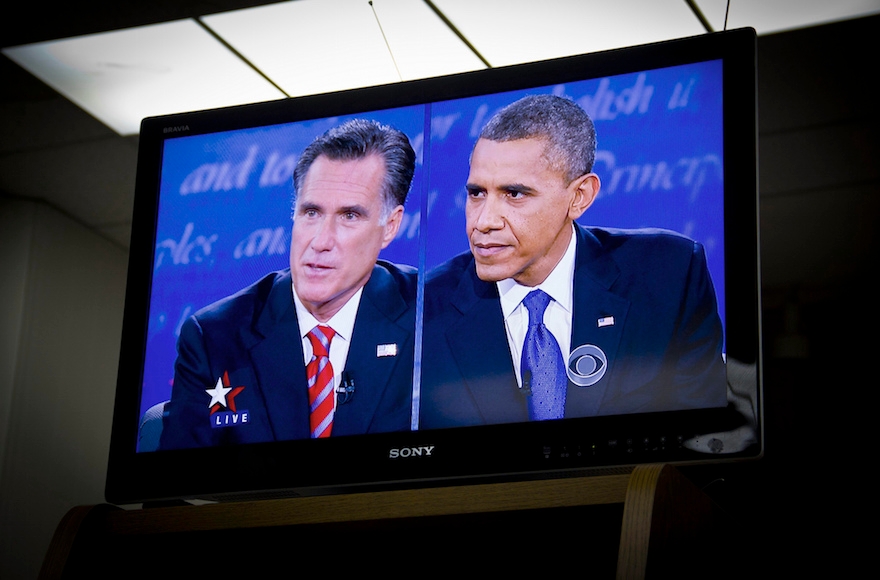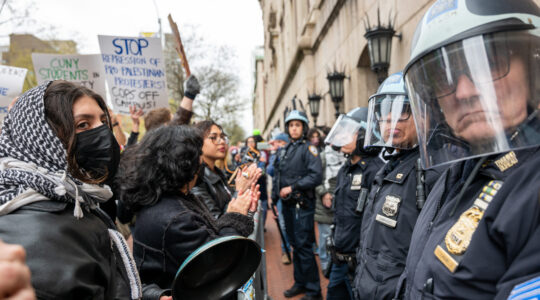
Mitt Romney, left, and President Obama, shown onscreen during their debate on Oct. 22, 2012, were generally in agreement on the Middle East at the Florida one-on-one on foreign policy. (Rosa Trieu/Neon Tommy via CreativeCommons)
WASHINGTON (JTA) — Israel, a heated issue throughout the campaign, finally took center stage at the final presidential debate.
It was mentioned a total of 31 times by President Obama and Republican nominee Mitt Romney at Monday night’s foreign policy debate at Lynn University in Boca Raton, Fla. Actual policy differences, however, seemed to be in short supply.
Israel and the Iranian nuclear program were among the main topics in a debate that largely focused on the Middle East. But whether the subject was Iran sanctions, the need to stop Iran from acquiring nuclear weapons or the U.S. commitment to Israel, the clashing candidates sounded surprisingly similar notes.
Aaron David Miller, a vice president of the Woodrow Wilson Center for International Scholars, said the broad areas of agreement on the Middle East reflected a growing consensus among both parties that any president’s priority should be to focus on the struggling American economy and tread carefully overseas.
“There were tactical political reasons why the governor wanted to create the impression that he is a centrist,” said Miller, a former top Middle East negotiator in Republican and Democratic administrations, speaking of Romney. “But I think we are faced now for the first time since the end of the Cold War with a remarkable consensus on what we can do in the world. The public understands that we need to fix America’s broken house, but that we are also stuck in a region of the world where we can’t fix it or extricate from it.”
With sharp policy differences mostly missing, both candidates painted their support for Israel in personal terms. Romney cited the strength of his relationship with Israeli Prime Minister Benjamin Netanyahu. Obama spoke of how he was affected by a 2008 visit to Israel, with stops at its national Holocaust memorial Yad Vashem and the embattled town of Sderot.
Romney’s remark came as he dismissed out of hand a hypothetical proposal by the moderator, Bob Schieffer of CBS News, positing a last-minute warning call to the White House from Israeli Prime Minister Benjamin Netanyahu that Israeli bombers were on their way to Iran.
“Our relationship with Israel, my relationship with the prime minister of Israel, is such that we would not get a call saying our bombers are on the way or their fighters are on the way,” Romney said. “This is the kind of thing that would have been discussed and thoroughly evaluated well before.”
To draw a contrast, Romney accused Obama of saying that he wanted to “create daylight” between Israel and the United States. (The reference was to a 2009 meeting with Jewish leaders in which the president was pressed to have a policy of “no daylight” with Israel, to which Obama responded that such an approach had not advanced peace in the past. Obama, however, is not known to have called for a policy of proactively creating daylight between the two countries.)
Romney also criticized the president for not visiting Israel during his travels to the region. Obama responded by suggesting that Romney’s recent visit to Israel contrasted unfavorably with his own 2008 visit to the Jewish state as a presidential candidate.
“When I went to Israel as a candidate, I didn’t take donors,” Obama said. “I didn’t attend fundraisers. I went to Yad Vashem, the Holocaust museum there, to remind myself the nature of evil and why our bond with Israel will be unbreakable.”
Obama went on to recount his visit to the southern town of Sderot, which is near the Gaza Strip.
“And then I went down to the border towns of Sderot, which had experienced missiles raining down from Hamas,” he said. “And I saw families there who showed me there where missiles had come down near their children’s bedrooms. And I was reminded of what that would mean if those were my kids. Which is why as president, we funded an Iron Dome program to stop those missiles.”
The acrimony underlying the exchanges contrasted with the many overall agreements on policy that were acknowledged by the candidates a number of times.
Romney opened his statement during the Israel and Iran portion of the debate by seconding the president’s response to a question about whether the U.S. should regard an attack on Israel as an attack on itself.
“I want to underscore the same point the president made, which is that if I’m president of the United States, when I’m president of the United States, we will stand with Israel,” Romney said. “And if Israel is attacked, we have their back, not just diplomatically, not just culturally, but militarily.”
Romney expressed support for Obama’s Iran sanctions, although he faulted the president for introducing them later rather than sooner and claimed credit for calling for tougher sanctions in 2007 — although lawmakers for years before had been pressing the Clinton and second Bush administrations to institute such sanctions.
More critically, Romney’s emphasis was on “diplomatic and peaceful means” — a posture that aligned with Obama’s preference for exhausting all options before considering a military strike to keep Iran from acquiring a nuclear weapon.
“It is also essential for us to understand what our mission is in Iran, and that is to dissuade Iran from having a nuclear weapon through peaceful and diplomatic means,” Romney said. “It’s absolutely the right thing to do, to have crippling sanctions. I would have put them in place earlier. But it’s good that we have them.”
A Congressional Research Service report published last week found that sanctions were seriously affecting Iran’s economy but had not yet stopped its suspected nuclear weapons program. The report held out the prospect of that happening soon.
“A broad international coalition has imposed progressively strict economic sanctions on Iran’s oil export lifeline, producing increasingly severe effects on Iran’s economy,” the report said. “Many judge that Iran might soon decide it needs a nuclear compromise to produce an easing of sanctions.”
At the debate, Obama argued that the sanctions on Iran have been a policy success, saying that his administration “organized the strongest coalition and the strongest sanctions against Iran in history, and it is crippling their economy.”
Both candidates appeared to be on the same page when it came to adjudicating what circumstance would trigger consideration of a military strike.
“The clock is ticking,” Obama said. “We’re not going to allow Iran to perpetually engage in negotiations that lead nowhere. And I’ve been very clear to them. You know, because of the intelligence coordination that we do with a range of countries, including Israel, we have a sense of when they would get breakout capacity, which means that we would not be able to intervene in time to stop their nuclear program.”
Romney agreed, saying, “Of course, a military action is the last resort. It is something one would only — only consider if all of the other avenues had been — had been tried to their full extent.”
The candidates also shared agreement on other Middle Eastern issues. Romney’s campaign has assailed Obama for months for not doing enough to intervene in Syria, but during the debate the Republican candidate made clear that he, like the president, opposed direct U.S. military involvement. Romney did favor arming some of the rebels.
Romney also accused Obama of failing to advance Israeli-Palestinian peace. Liberal critics of Romney had seized upon a secretly recorded meeting he had in May with Florida donors in which he expressed doubt that there would be any opportunities to advance the peace process in the near future.
But at the debate, Romney seemed to suggest that the failure to make progress for peace was not inevitable but rather a policy failure by the president.
“Is — are Israel and the Palestinians closer to — to reaching a peace agreement? Romney asked. “No, they haven’t had talks in two years.






